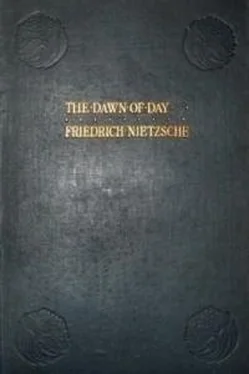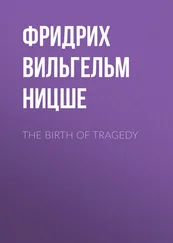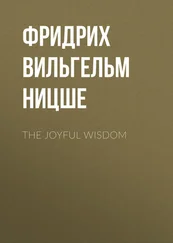531.
DIFFERENT FEELINGS TOWARDS ART.—From the time when we begin to live as a hermit, consuming and consumed, our only company being deep and prolific thoughts, we expect from art either nothing more, or else something quite different from what we formerly expected—in a word, we change our taste. For in former times we wished to penetrate for a moment by means of art into the element in which we are now living permanently: at that time we dreamt ourselves into the rapture of a possession which we now actually possess. Indeed, flinging away from us for the time being what we now have, and imagining ourselves to be poor, or to be a child, a beggar, or a fool, may now at times fill us with delight.
532.
“LOVE EQUALISES.”—Love wishes to spare the other to whom it devotes itself any feeling of strangeness: as a consequence it is permeated with disguise and simulation; it keeps on deceiving continuously, and feigns an equality which in reality does not exist. And all this is done so instinctively that women who love deny this simulation and constant tender trickery, and have even the audacity to assert that love equalises (in other words that it performs a miracle)!
This phenomenon is a simple matter if one of the two permits himself or herself to be loved, and does not deem it necessary to feign, but leaves this to the other. No drama, however, could offer a more intricate and confused instance than when both persons are passionately in love with one another; for in this case both are anxious to surrender and to endeavour to conform to the other, and finally they are both at a loss to know what to imitate and what to feign. The beautiful madness of this spectacle is too good for this world, and too subtle for human eyes.
533.
WE BEGINNERS.—How many things does an actor see and divine when he watches another on the stage! He notices at once when a muscle fails in some gesture; he can distinguish those little artificial tricks which are so calmly practised separately before the mirror, and are not in conformity with the whole; he feels when the actor is surprised on the stage by his own invention, and when he spoils it amid this surprise.—How differently, again, does a painter look at some one who happens to be moving before him! He will see a great deal that does not actually exist in order to complete the actual appearance of the person, and to give it its full effect. In his mind he attempts several different illuminations of the same object, and divides the whole by an additional contrast.—Oh, that we now possessed the eyes of such an actor and such a painter for the province of the human soul!
534.
SMALL DOSES.—If we wish a change to be as deep and radical as possible, we must apply the remedy in minute doses, but unremittingly for long periods. What great action can be performed all at once? Let us therefore be careful not to exchange violently and precipitately the moral conditions with which we are familiar for a new valuation of things,—nay, we may even wish to continue living in the old way for a long time to come, until probably at some very remote period we become aware of the fact that the new valuation has made itself the predominating power within us, and that its minute doses to which we must henceforth become accustomed have set up a new nature within us.—We now also begin to understand that the last attempt at a great change of valuations—that which concerned itself with political affairs (the “great revolution”)—was nothing more than a pathetic and sanguinary piece of quackery which, by means of sudden crises, was able to inspire a credulous Europe with the hope of a sudden recovery, and has therefore made all political invalids impatient and dangerous up to this very moment.
535.
TRUTH REQUIRES POWER.—Truth in itself is no power at all, in spite of all that flattering rationalists are in the habit of saying to the contrary. Truth must either attract power to its side, or else side with power, for otherwise it will perish again and again. This has already been sufficiently demonstrated, and more than sufficiently!
536.
THE THUMBSCREW.—It is disgusting to observe with what cruelty every one charges his two or three private virtues to the account of others who may perhaps not possess them, and whom he torments and worries with them. Let us therefore deal humanely with the “sense of honesty,” although we may possess in it a thumbscrew with which we can worry to death all these presumptuous egoists who even yet wish to impose their own beliefs upon the whole world—we have tried this thumbscrew on ourselves!
537.
MASTERY.—We have reached mastery when we neither mistake nor hesitate in the achievement.
538.
THE MORAL INSANITY OF GENIUS.—In a certain category of great intellects we may observe a painful and partly horrible spectacle: in their most productive moments their flights aloft and into the far distance appear to be out of harmony with their general constitution and to exceed their power in one way or another, so that each time there remains a deficiency, and also in the long run a defectiveness in the entire machinery, which latter is manifested among those highly intellectual natures by various kinds of moral and intellectual symptoms more regularly than by conditions of bodily distress.
Thus those incomprehensible characteristics of their nature—all their timidity, vanity, hatefulness, envy, their narrow and narrowing disposition—and that too personal and awkward element in natures like those of Rousseau and Schopenhauer, may very well be the consequences of a periodical attack of heart disease; and this in its turn may be the result of a nervous complaint, and this latter the consequence of —— [16] This omission is in the original.—TR.
So long as genius dwells within us we are full of audacity, yea, almost mad, and heedless of health, life, and honour; we fly through the day as free and swift as an eagle, and in the darkness we feel as confident as an owl.—But let genius once leave us and we are instantly overcome by a feeling of the most profound despondency: we can no longer understand ourselves; we suffer from everything that we experience and do not experience; we feel as if we were in the midst of shelterless rocks with the tempest raging round us, and we are at the same time like pitiful childish souls, afraid of a rustle or a shadow.—Three–fourths of all the evil committed in the world is due to timidity; and this is above all a physiological process.
539.
DO YOU KNOW WHAT YOU WANT?—Have you never been troubled by the fear that you might not be at all fitted for recognising what is true? by the fear that your senses might be too dull, and even your delicacy of sight far too blunt? If you could only perceive, even once, to what extent your volition dominates your sight! How, for example, you wished yesterday to see more than some one else, while to–day you wish to see it differently! and how from the start you were anxious to see something which would be in conformity with or in opposition to anything that people thought they had observed up to the present. Oh, those shameful cravings! How often you keep your eyes open for what is efficacious, for what is soothing, just because you happen to be tired at the moment! Always full of secret predeterminations of what truth should be like, so that you—you, forsooth!—might accept it! or do you think that to–day, because you are as frozen and dry as a bright winter morning, and because nothing is weighing on your mind, you have better eyesight! Are not ardour and enthusiasm necessary to do justice to the creations of thought?—and this indeed is what is called sight! as if you could treat matters of thought any differently from the manner in which you treat men. In all relations with thought there is the same morality, the same honesty of purpose, the same arrière–pensée , the same slackness, the same faint–heartedness—your whole lovable and hateful self! Your physical exhaustion will lend the things pale colours whilst your feverishness will turn them into monsters! Does not your morning show the things in a different light from the evening? Are you not afraid of finding in the cave of all knowledge your own phantom, the veil in which truth is wrapped up and hidden from your sight? Is it not a dreadful comedy in which you so thoughtlessly wish to take part?
Читать дальше











